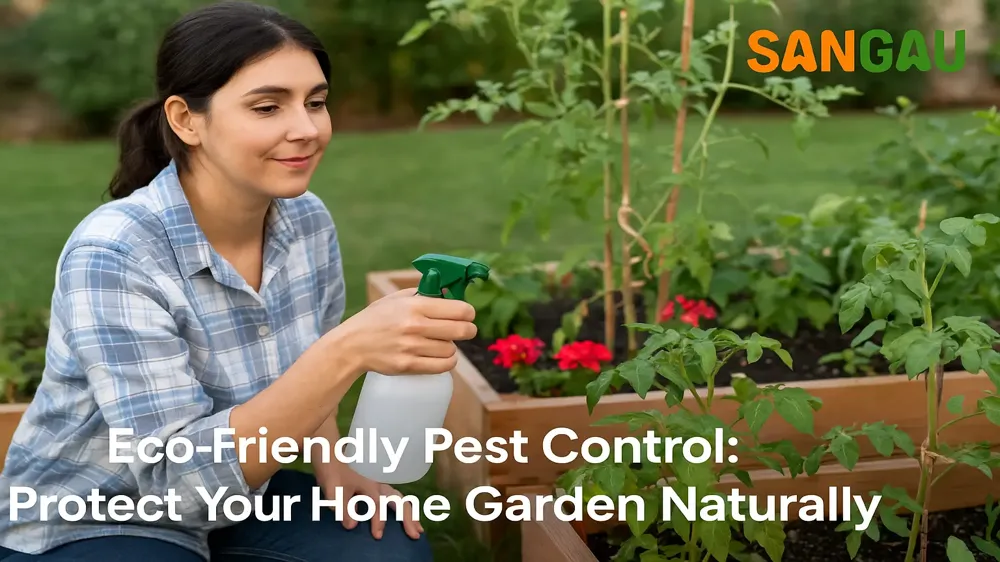Eco-Friendly Pest Control - Protect Your Home Garden Naturally
Published : 24 Jun 2025

Eco-Friendly Pest Control: Protect Your Home Garden Naturally
A thriving home garden brings immense joy, but unwanted pests can pose a significant threat to the health of your beloved plants. While chemical pesticides might seem like a quick fix, they often come with a hefty price tag: harming beneficial insects, damaging the environment, and even jeopardising your family's well-being. Thankfully, natural pest control methods offer an effective and sustainable alternative. By embracing eco-friendly techniques, you can maintain a healthy, pest-free garden while contributing to a balanced ecosystem. This guide will explore the best natural solutions for keeping garden pests at bay without resorting to harmful chemicals.
1. Identifying Common Garden Pests
Before tackling any pests, it's crucial to correctly identify them. Common garden nuisances include aphids, whiteflies, mealybugs, caterpillars, slugs, and spider mites. Each pest leaves its own distinctive mark – aphids, for example, suck sap from young shoots, leading to stunted growth, while slugs create irregular holes in leaves, particularly in leafy greens. Keep an eye out for yellowing leaves, sticky residue, or webbing on your plants, as these can be early signs of infestation. Prompt identification is key to swift action and preventing widespread problems.
2. Attracting Beneficial Insects for Natural Defence
Nature provides us with a powerful defence in the form of beneficial insects such as ladybirds, lacewings, and parasitic wasps. These natural predators help to keep harmful pests in check. Ladybirds, for instance, love to devour aphids, while lacewing larvae target mites and thrips. To attract these helpful allies, plant nectar-rich flowers like marigolds, dill, and cosmos. By encouraging a garden rich in biodiversity, you can naturally reduce the need for intervention and create a healthier environment for your plants.
3. Neem Oil: The Ultimate Natural Pesticide
Neem oil, extracted from the neem tree, is a highly effective organic pesticide that disrupts the life cycle of pests like whiteflies, aphids, and spider mites. Unlike chemical alternatives, neem oil is safe for beneficial insects while targeting the harmful ones. To use it, mix one teaspoon of neem oil with a litre of water and a few drops of mild soap to emulsify. Generously spray this solution on infested plants, making sure to reach the undersides of leaves where pests often hide. Reapply every 7–10 days for long-term effectiveness.
4. Homemade Garlic and Chilli Sprays for Repelling Pests
Garlic and chilli-based sprays are potent natural deterrents against pests. The strong odour of garlic repels aphids and whiteflies, while the spiciness of chilli deters caterpillars, beetles, and slugs. To make a spray, blend a handful of garlic cloves or chilli peppers with water, strain the mixture, and add a small amount of soap to help it stick to the plants. Apply this spray every few days to protect your plants. These homemade solutions are not only affordable but also safe for the environment and your household.
5. Diatomaceous Earth: A Natural Barrier Against Crawling Pests
Diatomaceous earth (DE) is a fine powder derived from fossilised algae that's very effective at eliminating crawling pests like ants, beetles, and slugs. The microscopic, sharp particles of DE penetrate the exoskeleton of these pests, causing dehydration. To use it, sprinkle a thin layer around the base of your plants, ensuring the powder stays dry for maximum efficiency. As DE is safe for humans and pets, it's an excellent eco-friendly option for controlling garden pests.
6. Companion Planting for Pest Prevention
Companion planting is a strategic approach to pest control where specific plants are grown together for mutual benefit. Marigolds, for example, deter nematodes when planted near tomatoes, while basil helps to keep mosquitoes and flies away. Nasturtiums act as a natural repellent against aphids and beetles in cucumber patches. This gardening method not only reduces pest infestations but also promotes biodiversity and improves soil health.
7. Enhancing Soil Health for Stronger Plants
Healthy soil leads to stronger plants, making them more resilient to pest attacks. Rich, aerated soil ensures robust plant growth, reducing vulnerability to infestations. Regularly enrich your soil with organic matter like compost, manure, or mulch to maintain its fertility. Crop rotation also plays a crucial role in preventing soil-borne pests and diseases. A well-nourished garden is naturally less susceptible to pest problems.
8. Smart Watering Practices to Deter Pests
Both overwatering and underwatering can attract pests. Too much moisture encourages fungal growth and pests like fungus gnats, while drought-stressed plants are more prone to infestations. Watering your garden early in the morning allows excess moisture to evaporate, reducing the risk of fungal issues. Drip irrigation systems are a great option as they deliver water directly to the roots, keeping foliage dry and less inviting to pests.
9. Regular Inspections and Manual Pest Removal
Early detection is key to effective pest control. Regularly inspect leaves, stems, and soil for eggs, webbing, or discoloured patches that might indicate pest activity. Handpicking caterpillars or using a strong jet of water to remove aphids are simple but effective techniques. Pruning heavily infested areas can also help to prevent the spread of pests. Routine monitoring ensures prompt action, preventing serious damage.
10. DIY Traps and Protective Barriers
Homemade traps and physical barriers can provide additional protection against pests. Shallow dishes filled with beer attract and drown slugs, while sticky traps capture whiteflies and fungus gnats. Copper tape around planters deters slugs, and fine mesh netting can keep caterpillars and beetles away from your crops. These simple, chemical-free solutions effectively safeguard your plants.
Bonus Tip: Creating a Self-Sustaining Garden Ecosystem
Sustainable pest control goes beyond simply repelling pests – it involves fostering a balanced garden ecosystem where plants, insects, and animals coexist harmoniously. By introducing native plant species, maintaining pollinator-friendly flowers, and avoiding synthetic pesticides, you can establish a self-regulating environment. Over time, this holistic approach minimises pest problems while supporting biodiversity and sustainability.
Hashtags:
#EcoFriendlyGardening #NaturalPestControl #SustainableLiving #GardenTips #SANGAU


